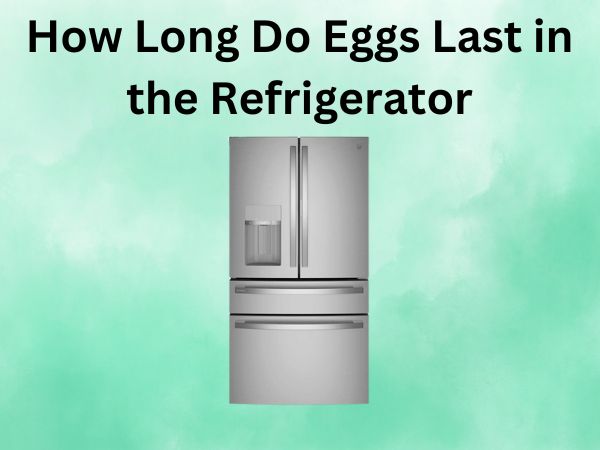How Long Do Eggs Last in the Refrigerator [Your Complete Guide]
Have you ever stood in front of your open refrigerator, staring at that carton of eggs, wondering if they’re still good to eat? You’re not alone! This age-old kitchen dilemma has puzzled home cooks for generations. The truth is, understanding egg storage isn’t just about avoiding waste – it’s about keeping your family safe and getting the most out of your grocery budget.
Eggs are like the Swiss Army knife of the kitchen – versatile, nutritious, and essential for countless recipes. But their longevity can be tricky to navigate. Unlike milk with its obvious sour smell or bread with visible mold, eggs keep their secrets hidden behind that protective shell. That’s why knowing the ins and outs of egg storage is crucial for every home cook.
Table of Contents
Understanding Egg Freshness: The Basics
What Determines How Long Eggs Stay Fresh?
Think of an egg as nature’s perfectly packaged food system. The shell isn’t just a container – it’s a sophisticated barrier that protects the delicate contents inside. Several factors work together to determine how long your eggs will stay fresh and safe to eat.
The age of the egg when you buy it plays a huge role. Most store-bought eggs are already one to two weeks old by the time they reach your refrigerator. This isn’t necessarily bad – it just means you need to factor this into your storage timeline.
Storage conditions are equally important. Temperature fluctuations, humidity levels, and even how you handle the eggs can significantly impact their lifespan. It’s like caring for a delicate flower – the right environment makes all the difference.
The Science Behind Egg Deterioration
As eggs age, several changes occur inside that shell. The egg white becomes thinner and less viscous, while the yolk membrane weakens. The air cell inside the egg grows larger as moisture evaporates through the porous shell. These changes don’t happen overnight, but they’re constantly occurring from the moment the egg is laid.
The protective coating on the shell, called the bloom or cuticle, naturally wears away over time. This coating is your egg’s first line of defense against bacteria and moisture loss. Once it’s compromised, the egg becomes more vulnerable to spoilage.
How Long Do Different Types of Eggs Last in the Fridge?
Raw Whole Eggs in Shell
Here’s the golden rule: fresh eggs in their shells can last 3-5 weeks in the refrigerator when stored properly. But here’s where it gets interesting – the “sell by” date on the carton isn’t actually an expiration date. It’s more like a suggestion for peak quality.
Most eggs remain safe to eat for several weeks beyond this date if they’ve been refrigerated consistently. The key is understanding that freshness and safety are two different things. An egg might not be at its peak freshness for making meringues, but it could still be perfectly safe for baking or scrambling.
Raw Egg Whites
Once you separate eggs, the clock starts ticking faster. Raw egg whites stored in the refrigerator will stay fresh for 2-4 days. They’re more perishable than whole eggs because they’ve lost the protection of the shell and yolk.
If you’re meal prepping or have leftover egg whites from a recipe, store them in a clean, airtight container. Label it with the date – trust me, you’ll thank yourself later when you’re trying to remember when you separated those eggs.
Raw Egg Yolks
Egg yolks are the divas of the egg world – they’re more delicate and spoil faster than whites. Raw egg yolks will last 1-2 days in the refrigerator. Their high fat content makes them particularly susceptible to bacterial growth and rancidity.
To maximize their lifespan, cover egg yolks with a small amount of cold water before refrigerating. This prevents them from drying out and forming that unappetizing skin on top.
Hard-Boiled Eggs
Surprisingly, hard-boiled eggs don’t last as long as raw eggs in shells. Once cooked, they’ll stay fresh for about one week in the refrigerator. The cooking process removes the protective coating and makes the egg more porous, allowing bacteria to penetrate more easily.
Keep hard-boiled eggs in their shells until you’re ready to eat them – the shell provides some protection. If you’ve already peeled them, store them in a covered container and use within 2-3 days.
Cooked Egg Dishes
Casseroles, quiches, scrambled eggs, and other cooked egg dishes follow the general rule for cooked foods: they’ll stay safe for 3-4 days in the refrigerator. The key is getting them into the fridge within two hours of cooking.
Think of cooked egg dishes as you would any other leftover – they need proper cooling and storage to stay safe. Use shallow containers to help them cool quickly and evenly.
Proper Egg Storage Techniques
Where to Store Eggs in Your Refrigerator
Forget that cute egg holder in your refrigerator door – it’s not doing your eggs any favors. The door is the warmest part of your fridge, with temperatures that fluctuate every time you open it. It’s like putting your eggs on a temperature roller coaster.
Instead, store eggs in their original carton on a shelf inside the main body of the refrigerator. The carton protects the eggs from absorbing odors and flavors from other foods (eggs are surprisingly good at this), and it helps maintain consistent humidity.
Should You Wash Eggs Before Storing?
This might surprise you, but you shouldn’t wash eggs before storing them. In the United States, commercial eggs are already washed and sanitized before packaging. Washing them again at home can actually remove the protective coating and create tiny cracks in the shell.
If you notice dirt or debris on an egg, it’s better to clean it just before use rather than before storage. Think of it like washing berries – you do it right before eating, not when you bring them home.
Temperature Control: Why It Matters
Eggs are happiest when they’re kept at a consistent 40°F (4°C) or below. Temperature fluctuations cause the egg contents to expand and contract, which can damage the shell and allow bacteria to enter.
Avoid leaving eggs out on the counter for extended periods. Room temperature eggs might be better for some baking applications, but they should only be left out for the time needed for your recipe – typically no more than two hours.
How to Tell if Eggs Have Gone Bad
The Float Test: Your Best Friend
When in doubt, let physics be your guide. The float test is the most reliable way to check egg freshness at home. Fill a bowl with cold water and gently place the egg inside. Fresh eggs will sink to the bottom and lay flat. Older but still good eggs will sink but stand upright. If an egg floats to the surface, it’s time to say goodbye.
This test works because as eggs age, the air cell inside grows larger, making the egg more buoyant. It’s like a built-in freshness indicator that nature provided.
Visual and Smell Indicators
Your nose and eyes are powerful tools for detecting spoiled eggs. When you crack open a fresh egg, the white should be clear (not cloudy) and the yolk should be firm and round. Any unusual colors, strange odors, or slimy textures are red flags.
A spoiled egg will have an unmistakable sulfur smell – once you’ve encountered it, you’ll never forget it. Trust your instincts; if something seems off, it probably is.
Crack Test: What to Look For
When you crack an egg, pay attention to how it behaves. A fresh egg will have a thick, viscous white that stays close to the yolk. The yolk should be plump and round, sitting high in the white.
Older eggs will have thinner whites that spread out more, and the yolk might appear flatter. While these eggs might not be ideal for poaching or frying sunny-side up, they’re still perfectly safe for baking or scrambling.
Food Safety Guidelines for Egg Storage
USDA Recommendations
The United States Department of Agriculture provides clear guidelines for egg safety. They recommend using eggs within 3-5 weeks of purchase and always storing them at 40°F or below. These guidelines aren’t just suggestions – they’re based on extensive research into food safety and bacterial growth patterns.
The USDA also emphasizes the importance of cooking eggs to an internal temperature of 160°F to eliminate any potential salmonella bacteria. This is especially important for vulnerable populations like pregnant women, young children, and elderly individuals.
When in Doubt, Throw It Out
Food safety experts live by this simple rule, and you should too. If you’re questioning whether an egg is still good, it’s better to err on the side of caution. The cost of a few eggs is nothing compared to the potential cost of foodborne illness.
This principle applies to any food, but it’s especially important with eggs since they can harbor bacteria that cause serious illness. Your health is worth more than saving a few cents on eggs.
Extending Egg Shelf Life: Pro Tips
Freezing Eggs: What You Need to Know
You can’t freeze whole eggs in their shells (they’ll crack), but you can freeze beaten eggs for up to one year. Separate the whites and yolks, or beat them together, then store in ice cube trays or freezer-safe containers.
For best results with frozen egg yolks, add a pinch of salt or sugar before freezing to prevent them from becoming too thick and gel-like. Label everything with dates – frozen eggs all look the same after a few months.
Preservation Methods That Work
Besides freezing, you can extend egg life by keeping them as fresh as possible from the start. Buy eggs from stores with high turnover, check the sell-by dates, and get them into your refrigerator quickly after purchase.
Consider buying smaller quantities more frequently rather than stocking up, especially if you don’t use eggs regularly. Fresh ingredients always yield better results in cooking and baking.
Common Egg Storage Mistakes to Avoid
One of the biggest mistakes people make is storing eggs at room temperature. Unlike many European countries where eggs aren’t washed before sale and can be stored on the counter, American eggs must be refrigerated due to the processing they undergo.
Another common error is transferring eggs to those decorative egg holders or removing them from their original cartons. The carton provides important information like the sell-by date and lot number, and it protects the eggs from damage and odor absorption.
Don’t store eggs near strong-smelling foods like onions or fish. Eggs can absorb odors through their porous shells, affecting their taste. Keep them in their carton, away from aromatic foods.
Frequently Asked Questions
Q: Can I eat eggs past their expiration date? A: Yes, eggs are often safe to eat several weeks past the “sell by” date printed on the carton if they’ve been properly refrigerated. Use the float test and your senses to determine if they’re still good. The date on the carton is more about peak quality than safety.
Q: Why do some countries store eggs at room temperature while others refrigerate them? A: It depends on how the eggs are processed. In the US, eggs are washed and sanitized, removing the natural protective coating, so they must be refrigerated. In many European countries, eggs aren’t washed and retain their natural protection, allowing room temperature storage.
Q: Is it safe to eat raw eggs in recipes like homemade mayonnaise or cookie dough? A: While the risk is relatively low with fresh, properly stored eggs, raw eggs can potentially contain salmonella. Consider using pasteurized eggs for raw applications, especially if serving to pregnant women, young children, elderly individuals, or anyone with compromised immune systems.
Q: What’s the white stringy thing I sometimes see in eggs? A: Those are called chalazae – twisted strands of protein that anchor the yolk in the center of the egg. They’re completely normal and actually indicate a fresher egg. You can remove them if desired, but they’re perfectly safe to eat.
Q: Can I freeze whole eggs for later use? A: You cannot freeze whole eggs in their shells as they will crack. However, you can freeze beaten whole eggs, separated whites, or yolks (with a pinch of salt or sugar added) for up to one year. Thaw them in the refrigerator before use.
Conclusion
Understanding how long eggs last in the refrigerator isn’t just about food safety – it’s about maximizing the value of your grocery purchases and ensuring you always have fresh ingredients for your favorite recipes. Remember that whole eggs in shells can last 3-5 weeks when stored properly, while separated or cooked eggs have much shorter lifespans.
The key to egg storage success lies in consistency: consistent temperature, proper storage location, and regular quality checks. When you combine proper storage techniques with reliable freshness tests like the float method, you’ll never have to guess about egg quality again.
Your refrigerator is already doing most of the work for you – you just need to give your eggs the right environment to stay fresh and safe. Keep them in their original carton, store them on a shelf rather than in the door, and trust your senses when evaluating their quality.




